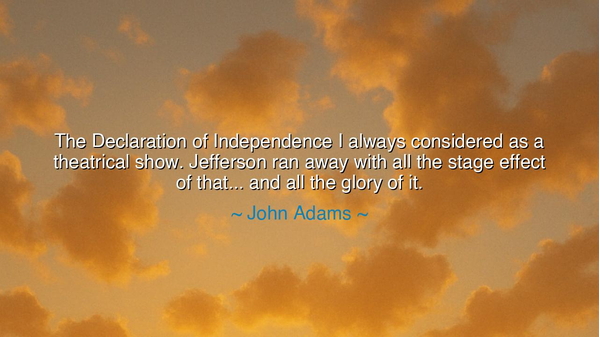
The Declaration of Independence I always considered as a
The Declaration of Independence I always considered as a theatrical show. Jefferson ran away with all the stage effect of that... and all the glory of it.






When John Adams declared, “The Declaration of Independence I always considered as a theatrical show. Jefferson ran away with all the stage effect of that... and all the glory of it,” he spoke not in bitterness, but with the weary wisdom of one who had borne the heavy burden of unseen labor. Beneath those words lies a deep meditation on glory, recognition, and the nature of human fame. Adams was no stranger to sacrifice; he had fought with mind and heart to bring a nation into being. Yet history, ever seduced by spectacle, had bestowed her crown upon another—Thomas Jefferson, the eloquent penman whose words became immortal. Thus Adams saw, as all wise men eventually do, that the world rewards not only truth or toil, but also the power of presentation—the art of the stage.
The origin of this remark lies in the twilight of Adams’s life, when age had cooled the fires of ambition but not dimmed the clarity of insight. Looking back upon the great events of 1776, he recalled how he, more than any man, had urged Congress toward independence—had fought, persuaded, and borne the wrath of hesitation. Yet when the moment of writing came, it was Jefferson who took the quill. Adams, the warrior of words, yielded to the younger Virginian, who possessed a poet’s grace and a statesman’s restraint. The Declaration, therefore, became not only the nation’s founding document but also Jefferson’s eternal stage—a moment of brilliance that history would forever call his.
In calling it a theatrical show, Adams did not scorn the Declaration, but rather acknowledged the drama of history itself. Great acts of creation are not only battles of reason—they are performances before the eyes of men and posterity. The stage, though made of parchment and ink, demands actors who can move hearts as well as minds. Adams, the iron spirit of independence, built the scaffold upon which the nation would stand. Jefferson, the artist of ideals, adorned it with words that sang like music. One labored in the furnace; the other stood in the light. Thus, the elder statesman saw how fame and glory often favor the one who wields beauty over the one who bears pain.
This truth has echoed through the corridors of time. Consider the tale of Nikola Tesla and Thomas Edison. Tesla, the dreamer of lightning, conceived the visions that shaped the modern age—alternating current, radio waves, the wireless future. But it was Edison, the showman, who claimed the applause. The crowd saw Edison’s lamps glow and called him the father of invention, while Tesla died in obscurity, his genius misunderstood. Like Adams and Jefferson, they show us that the theatrical show of history often shines brighter upon the performer than the builder. Yet without the unseen laborer, the curtain would never rise.
There is a deeper sorrow, and a deeper beauty, in Adams’s words. For he speaks to the eternal tension between substance and glory. The world may honor the one who delivers the speech, but it is the thinker, the persuader, the relentless spirit behind the stage who gives the moment its soul. Adams reminds us that true greatness is not measured by applause, but by contribution. To serve a noble cause, even without reward, is the mark of an immortal spirit. For while Jefferson’s pen captured the imagination of men, it was Adams’s relentless conviction that made independence inevitable.
Yet Adams’s humility in the face of forgotten glory is itself a lesson in virtue and perspective. He understood, in his later years, that no man truly owns the glory of a great act. The Declaration belonged not to Jefferson, nor to Adams, but to the idea of liberty itself. Every generation adds its own ink to that parchment, every citizen who fights for justice continues its writing. Adams’s lament, then, becomes a warning: do not seek the stage for its lights, but for the truth it can reveal. For the true servant of destiny cares not for the applause of men, but for the applause of history’s conscience.
And so, my children of thought and action, hear the wisdom in these ancient words. The world may not always honor your labor. The glory of your work may be taken by others more visible, more adorned, more theatrical. Yet do not despair. The unseen builder, the steadfast worker, the mind that labors in silence—these are the pillars upon which all greatness stands. Let your ambition be not for glory, but for legacy. Build so firmly that the stage may collapse, yet your foundation endures. Write your truth upon the world, and if others “run away with the glory,” smile—for you have already owned the substance.
Thus, the teaching is clear: work not for the praise of men, but for the blessing of truth. Be content to labor unseen if the cause is just. And when your time comes to look back upon your life, may you, like Adams, see that though others claimed the stage, you built the theater itself—and that is the greater triumph.






AAdministratorAdministrator
Welcome, honored guests. Please leave a comment, we will respond soon